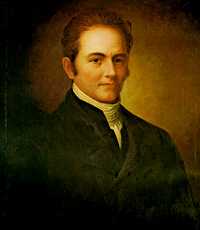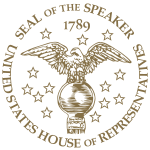Langdon Cheves
| Langdon Cheves | |
|---|---|
 | |
| 9th Speaker of the United States House of Representatives | |
| In office January 19, 1814 – March 4, 1815 | |
| President | James Madison |
| Preceded by | Henry Clay |
| Succeeded by | Henry Clay |
| Member of the U.S. House of Representatives from South Carolina's 1st district | |
| In office December 31, 1810 – March 4, 1815 | |
| Preceded by | Robert Marion |
| Succeeded by | Henry Middleton |
| Attorney General of South Carolina | |
| In office December 8, 1808 – December 4, 1810 | |
| Governor | John Drayton |
| Preceded by | John Julius Pringle |
| Succeeded by | John S. Richardson |
| Member of the South Carolina House of Representatives from St. Philip's and St. Michael's Parish | |
| In office November 24, 1806 – December 8, 1808 | |
| Personal details | |
| Born | September 17, 1776 Abbeville County, South Carolina |
| Died | June 26, 1857 (aged 80) Columbia, South Carolina |
| Political party | Democratic-Republican |
| Profession | Lawyer |
Langdon Cheves (pronounced chivis; September 17, 1776 – June 26, 1857) was an American politician, lawyer and businessman from South Carolina. He was a U. S. Representative from 1810 to 1815, served as Speaker of the House in 1814-1815, and was President of the Second Bank of the United States from 1819-1822.
Life and career
Cheves was born at Bull Town Fort, on the Rocky River in South Carolina. His father, Alexander, was a native of Scotland; his mother, Mary Langdon, was from Virginia. At the age of ten he went to Charleston to earn a living, and at sixteen had become confidential clerk in a large mercantile house.
In spite of the advice of his friends, who thought him "born to be a merchant", he began studying law at age 18. In 1797 he was admitted to the bar, and soon became eminent in his profession. Before 1808 his yearly income from his practice exceeded $20,000, making him wealthy for his time. In 1808 he became Attorney General of South Carolina, serving until 1810.
In 1806 he married Mary Elizabeth Dulles, of Charleston. In 1810 he was elected U.S. Representative as a Republican, winning both a special election to the remainder of the 10th Congress and a regular election to a full term in the 11th Congress. He was re-elected to the 12th Congress in 1812 and the 13th Congress in 1814.
Cheves soon distinguished himself. His speech on the merchants' bonds in 1811 was especially remarkable for its learning and eloquence. Washington Irving, who was present, said it gave him for the first time an idea of the manner in which the great Greek and Roman orators must have spoken.
Cheves was a zealous supporter of the War of 1812 (a "War Hawk"). He was chairman of the Naval Committee in 1812, and of the Committee of Ways and Means in 1813. When Speaker of the House Henry Clay was sent as commissioner to negotiate the Treaty of Ghent, Cheves succeeded him, defeating Felix Grundy. Cheves became the ninth Speaker on January 19, 1814, and served until March 4, 1815, when his Congressional term ended.
When Vice President Elbridge Gerry died on November 23, 1814, the office of President pro tempore of the Senate was vacant, and so Cheves became next in line for the Presidency. This ended two days later, when Senator John Gaillard was chosen President pro tempore.
Cheves' most memorable action as Speaker was the defeat of the re-charter of the First Bank of the United States.
With the war coming to end, Cheves declined to be a candidate for re-election in 1814. He devoted himself exclusively to his law practice in Charleston bar. In 1815, he was made a judge of the superior court of South Carolina.
In 1816 the Bank of the United States was rechartered, but within three years it was nearly ruined by mismanagement. In 1819 Cheves was elected President of its board of directors, and during the next three years succeeded in restoring its credit. In 1822 he resigned this post and was succeeded by Nicholas Biddle. Cheves was appointed chief commissioner of claims under the Treaty of Ghent.
Cheves had moved to Philadelphia, Pennsylvania while heading the Bank. He remained there and later in Lancaster, Pennsylvania, until 1829. He then returned to South Carolina, and lived in retirement on his plantation, writing occasional essays and reviews. In 1850 he declined appointment to the Senate vacancy caused by the death of John C. Calhoun. He died in Columbia, South Carolina on June 26, 1857.[1]
Secession advocate
Cheves was an early enthusiast for secession of the Southern slave-holding states from the United States. In the Nullification Crisis of 1832, he condemned the doctrine of Nullification as insufficient to protect Southern interests. He considered it folly for South Carolina to act alone, but he was strongly in favor of secession.
During the Crisis of 1850, Cheves was a delegate to the Nashville Convention of the slave-holding states (called to discuss common action by the slave states). At the Convention, the scheme of a separate southern confederacy was first proposed; Cheves supported it.
Cheves and evolution
Like many wealthy men of the day, Cheves was interested in science. The physician and geologist Joseph Le Conte was an acquaintance. In his autobiography, Le Conte wrote that Cheves had articulated to him a theory of evolution almost identical to Charles Darwin's, long before Darwin published his Origin of Species.[2] However, Cheves never published his ideas on the subject.
See also
- Lang Syne Plantation, the family plantation
Notes
- ↑ "Death of Hon. Langdon Cheves". The Mercury (Charleston, SC). 1857-06-27.
- ↑ Dabney, Virginius (1932). Liberalism in the South. Chapel Hill, NC: University of North Carolina Press. p. 84. ISBN 978-0-404-00146-9.
References
 This article incorporates text from a publication now in the public domain: Wilson, James Grant; Fiske, John, eds. (1891). "article name needed". Appletons' Cyclopædia of American Biography. New York: D. Appleton.
This article incorporates text from a publication now in the public domain: Wilson, James Grant; Fiske, John, eds. (1891). "article name needed". Appletons' Cyclopædia of American Biography. New York: D. Appleton.- Langdon Cheves at the Biographical Directory of the United States Congress
External links
| Political offices | ||
|---|---|---|
| Preceded by Henry Clay |
Speaker of the United States House of Representatives 19 January 1814 – 4 March 1815 |
Succeeded by Henry Clay |
| United States House of Representatives | ||
| Preceded by Robert Marion |
Representative from South Carolina's 1st congressional district 31 December 1810 – 3 March 1815 |
Succeeded by Henry Middleton |
| Legal offices | ||
| Preceded by John Julius Pringle |
Attorney General of South Carolina 1808–1810 |
Succeeded by John S. Richardson |
| Business positions | ||
| Preceded by William Jones |
President of the Second Bank of the United States 6 March 1819 – 1822 |
Succeeded by Nicholas Biddle |
| ||||||||
|

